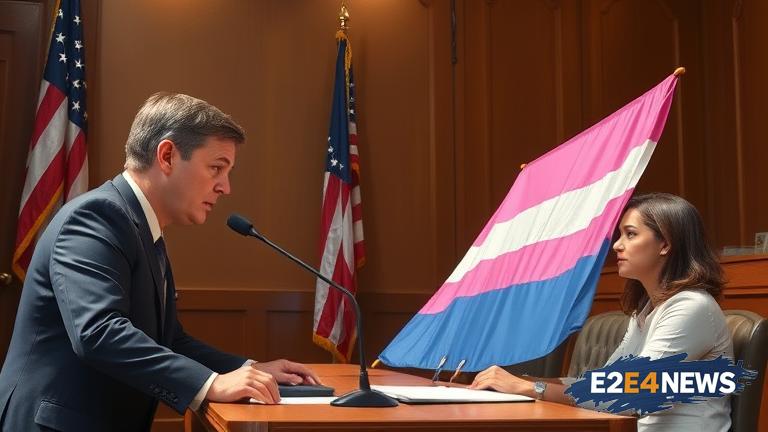A federal judge has made a landmark decision in the ongoing debate surrounding transgender rights, issuing an injunction against an Arkansas law that restricts access to healthcare for transgender youth. The law, which was set to go into effect, would have prohibited healthcare providers from offering gender-affirming care to minors, including hormone therapy and surgery. The judge’s decision comes after a lawsuit was filed by the American Civil Liberties Union (ACLU) and other advocacy groups, arguing that the law would cause irreparable harm to the transgender community. The plaintiffs claimed that the law would deny transgender youth access to essential medical care, leading to increased rates of depression, anxiety, and suicidal ideation. The judge agreed, stating that the law would likely cause significant harm to the community and that the plaintiffs had a high likelihood of success on the merits of their claim. The injunction will remain in place until the lawsuit is resolved, allowing healthcare providers to continue offering gender-affirming care to transgender youth. The decision has been met with praise from LGBTQ+ advocacy groups, who argue that the law was discriminatory and would have had devastating consequences for the community. The ACLU has stated that the decision is a major victory for transgender rights and will help to ensure that all individuals, regardless of their gender identity, have access to the medical care they need. The law was passed by the Arkansas state legislature earlier this year, with supporters arguing that it was necessary to protect children from making irreversible decisions about their gender identity. However, opponents argued that the law was based on misinformation and would have a disproportionate impact on transgender youth, who already face significant barriers to accessing healthcare. The judge’s decision is the latest development in a series of lawsuits challenging similar laws in other states. The issue has sparked a national debate about the rights of transgender individuals and the role of government in regulating healthcare. The decision is also likely to have implications for the ongoing debate about the use of puberty blockers and hormone therapy in treating gender dysphoria in minors. The judge’s ruling highlights the importance of protecting the rights of vulnerable populations, including transgender youth, and ensuring that they have access to the medical care they need to thrive. The lawsuit is ongoing, and the final outcome is still uncertain. However, the injunction is a significant step forward for the transgender community, who have been fighting for years to have their rights recognized and protected. The decision is also a reminder that the struggle for LGBTQ+ rights is far from over, and that continued advocacy and activism are necessary to ensure that all individuals are treated with dignity and respect. The judge’s ruling has been met with widespread praise from the medical community, with many healthcare providers stating that they are relieved that they can continue to provide essential care to their patients. The decision is also likely to have implications for the way that healthcare is delivered to transgender individuals, with many providers arguing that gender-affirming care is essential for promoting the health and well-being of this population. The lawsuit has sparked a national conversation about the importance of protecting the rights of transgender individuals, and the need for greater understanding and acceptance of this community. The decision is a major victory for the LGBTQ+ community, and a reminder that the fight for equality and justice is ongoing. The judge’s ruling is a significant step forward, but there is still much work to be done to ensure that all individuals, regardless of their gender identity, are treated with dignity and respect.





